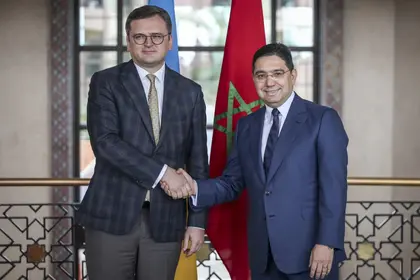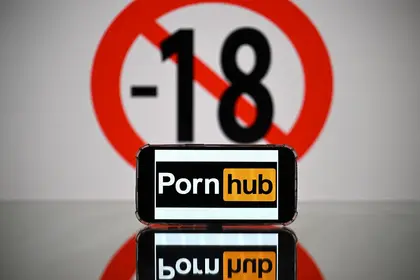As part of a “renaissance of relations,” Ukraine is reaching out to Africa in an effort to gain support for President Volodymyr Zelensky’s peace plan and to build other ties, according to Ukraine’s Foreign Minister Dmytro Kuleba, who is travelling to the continent this week.
But the trip is also an attempt to counter growing Russian influence in Africa and a part of broader strategy recently described to Kyiv Post by the Ministry for Foreign Affairs.
JOIN US ON TELEGRAM
Follow our coverage of the war on the @Kyivpost_official.
In October 2022, Kuleba undertook his initial visit to Africa and visited the sub-Saharan countries of Senegal, Côte d’Ivoire, Ghana and Kenya, which he called the beginning of the “renaissance of relations” on his Instagram account. However, his trip was cut short by missile attacks on Ukraine.
A senior spokesperson for Ukraine’s Ministry for Foreign Affairs recently highlighted to Kyiv Post Ukraine’s current concrete steps in Africa to cement relations. According to him, this broad initiative includes:
- the establishment of 10 new Ukrainian embassies;
- the development of “grain hubs” such as storage facilities in both east and west Africa;
- working to support Africa’s food sovereignty including as a “guarantor of food security.”
While no official itinerary has been made available for his trip, Kuleba said that he will visit countries across the continent.
The trip began Monday, May 22, in Morocco, during the first-ever visit to the North African nation since diplomatic relations were established. Kuleba said that he raised President Zelensky’s 10-Point Peace Formula proposal, as well as several economic opportunities such as international education, a sector that had been growing in Ukraine prior to Russia’s full-scale invasion.

‘Just Peace’ and ‘Lasting Peace’ – Nations React to Trump’s Inauguration
Kuleba posted that he has three priorities for the African visit:
- “to involve as many African countries as possible in the implementation of the [Zelensky] Peace Formula;
- to secure support for uninterrupted exports within the Black Sea Grain Initiative and the President’s Grain from Ukraine program;
- to create new opportunities for Ukrainian business.”
Africa needs Ukrainian grain
On May 18, one day before its expiration, the Black Sea Grain Initiative was renewed for an additional 60 days – without any multilateral agreement regarding Russia’s demand to open up an ammonia pipeline, crucial for the export of fertilizer and owned by a Putin ally, which flows into the port of Odesa.
In the lead-up, exports via the Initiative – started in August 2022 and accounting for 30.3 million tons of grain shipments to date – had dropped to record low levels due to technical blockages by Russian representatives.
Analysis of UN data by Kyiv Post shows that prerequisite ship inspections during May now stand at 2.9 per day, which is still the lowest ever under the agreement.
This slowdown critically impacts on the grain that Africa relies on. Previously under the Initiative, Ukraine exported more than 3 million tons of food to African countries through seaports. That includes some 1 million tons shipped to African countries in critical need, including Ethiopia, Somalia, and Sudan. Approximately 50 percent of that was within the framework of the UN food humanitarian programs and Grain from Ukraine.
The Grain from Ukraine program involves the purchase of Ukrainian grain by partner countries and its transfer to countries affected by humanitarian crisis. The program is implemented in partnership with the World Food Program under the auspices of the UN.
Peace proposals
In this context, Reuters reported that political analysts say Ukraine is accelerating its push to court the so-called Global South – a term meaning Latin America, Africa and much of Asia – and that the effort has taken on greater importance as rival peace proposals to end the war in Ukraine have popped up in other capitals.
Over the last period, various peace plans have been put forward by China, South Africa with five other African countries, the Vatican, and Brazil, which Kuleba characterized earlier this week as “mushrooms after rain.”
Ukraine says Zelensky’s 10-Point Peace Formula – a key pillar of which is the withdrawal of Russian forces from all Ukrainian territory – must be the basis for any settlement of the war launched by Russia.
Speaking at the G7 over the weekend, Zelensky proposed holding a global peace summit in July to promote the plan. Reuters reported that Denmark’s foreign minister said on Monday that Copenhagen would be prepared to host it, but noted that it would be “necessary to build interest” from so-called neutral countries, many of which are African.
Russia has been nurturing ties in Africa for years, Reuters noted, and is planning to hold an Africa-Russia summit in St. Petersburg in July. Moscow’s veteran foreign minister, Sergey Lavrov, toured the continent last year and has visited at least twice this year.
“There’s a growing realization in Europe and Ukraine that there’s a risk that this war will come to be seen as essentially a European conflict that other countries don’t need to be concerned about it and don’t need to condemn,” Nigel Gould-Davies of the International Institute for Strategic Studies told Reuters.
“What we have here is Europe and Ukraine responding to Russia’s concerted efforts to create a narrative in the world about the war that does not condemn the war and seeks to maintain a relationship with Russia,” he added.
The Foreign Ministry spokesperson also indicated to Kyiv Post the “strategic importance” of relations with Africa in the context of multilateral diplomacy, such as the UN, which can create a Special Tribunal to punish Russian aggression via a majority vote of its General Assembly.
In addition to the strategic imperatives, Kuleba also noted some practical aspects of improved Ukraine/Africa ties in his post.
“Africa is interested in Ukrainian goods and services, in particular, in food, medicines, high-tech equipment, education, experience in digital transformation and strengthening information stability, diplomatic experience, interaction in international organizations,” he said.
You can also highlight the text and press Ctrl + Enter










